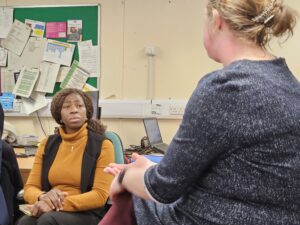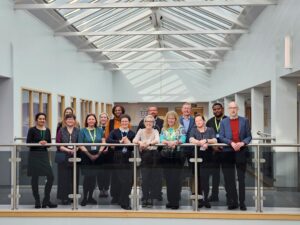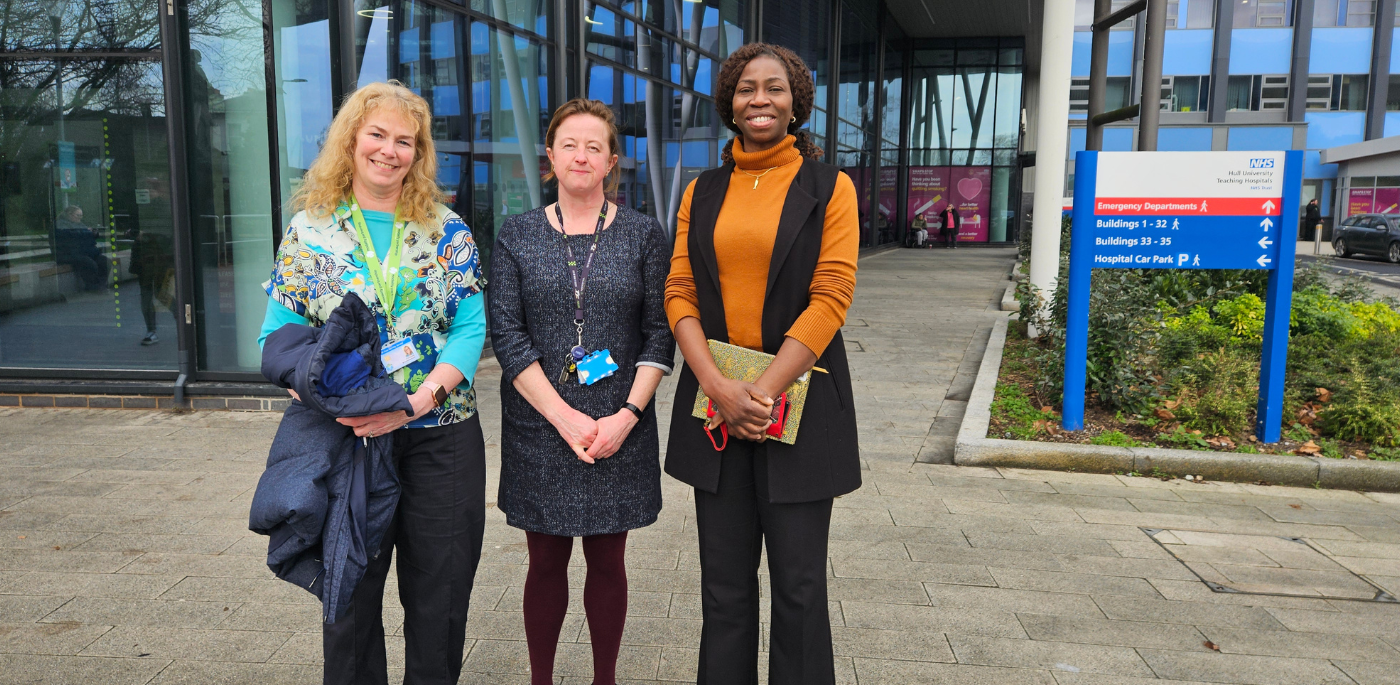It was a trip down Memory Lane for a very special visitor to Hull Royal Infirmary today.
Professor Bola Owolabi, a practising GP and NHS England’s National Director for Health Inequalities, made a welcome return to the hospital where she worked as a junior house officer years ago.
But recalling her days on the gastro ward weren’t the main reason for her return to Hull; she had come to visit the Homeless Health Team which works within HRI and to learn about their work to support safe discharge for this patient group.

Bola (left) chats to Anna from the Homeless Health Service
The visit had been organised in partnership with the homeless charity, Pathway, and Modality Partnership, which is commissioned to provide the Homeless Health Service.
At the start of her visit, Bola was very clear about wanting to make a difference:
“I’m really keen that our work at NHS England reaches our communities at the margins. I’m very mindful that health inequalities don’t happen in our plush offices in London, which is why it’s vital that we put boots on the ground. I spend a lot of my time visiting different places because I’m really keen to see how the policy papers we write translate on the ground and whether they are making a difference to the organisations and the people they’re intended to help.”
The Homeless Health Service started in October 2019. The team holds an honorary contract with the Trust and is based within the Craven Building alongside partners from Re:New drug and alcohol service.
Bola spent the first part of her visit getting to know the team, asking about their challenges and the benefits of having a service like this embedded within an acute setting. She heard how it’s not without its difficulties, and how the pressure to discharge patients and free up beds don’t always work in the interests of patients whose ongoing needs are more complex. However, the team also explained that it provided some great opportunities to offer truly holistic care and to share knowledge with clinical colleagues on matters such as substance or alcohol misuse, and associated behaviours, which aren’t always their area of expertise. The team also explained how their role saw them acting as hospital gatekeepers at times, promoting the use of community detox where appropriate and encouraging homeless people to engage with primary care services to try and help avoid hospital admissions.

Bola said she learned a lot from colleagues today
Bola urged the team to consider how they show they are adding value, not just morally because it’s the right thing to do, but because it makes sense from a service and commissioning perspective. She was keen that the Homeless Health Team’s partners and commissioners hear about the team’s successes not just on an individual patient level, but to show how their interventions, and doing the right thing first time, can help to save time, resources and many repeat attendances further down the line.
Accompanied by Anna and Michelle from the Homeless Health Team, Bola then moved over to the tower block, where she was introduced to two patients with no fixed address who are currently being cared for on wards. She spent time chatting with them about their barriers to good health and wellbeing, but she was also keen to look for the positives, seeking to understand what is working for those patients now and what they want to happen when they finally leave hospital.
Concluding her visit at Hull Royal Infirmary, Bola said:
“This has really been a career fulfilling visit, and visits like today’s are so important in helping us to understand how our national policy translates into practice, the rhetoric into reality; what does it really mean for the people we care for?
“Having started out in Hull as a junior house officer on the wards many years ago, to now returning in a different capacity, I have really learned so much from the team and the patients and I hope to be able to make a difference with this knowledge going forward. It was really wonderful to be back.”
After a lunch with members of the wider team and primary care colleagues, Bola thanked the team for making her visit ‘real’. She then spent the afternoon in Hull City Centre at ‘The Hub’ where she was able to speak with more agencies supporting the city’s homeless and rough sleepers.

